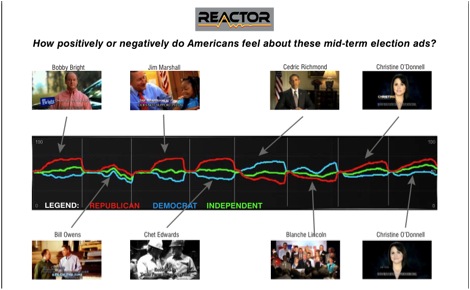While several Democratic candidates are working to distance themselves from an increasingly unpopular administration, Democratic voters nationwide still respond better to an endorsement from President Obama than one from former President Bill Clinton, according to just-released research from maslansky luntz + partners and Roy Morgan Research
Additionally, Delaware Republican Senate candidate Christine O'Donnell's "I'm not a witch" ad scores well not only with Republicans but with independents and even some Democrats. And the strongest line of the week comes from Democratic Congressional candidate Bobby Bright of Kentucky whose claim of being "the most independent member of congress" resonated with voters from all parties nationwide.
We tested eight political TV ads using The Reactor, a technology that taps into voters' emotional responses to understand exactly how voters feel when they view ads and hear political messages. This week's test was conducted with 532 Democrats, Independents and Republicans from around the country to gauge voters' second-to-second, gut reactions.
Note: while the ads tested were for local Congressional and Senate races, they were tested with voters across the country and thus reflect national political sentiment.
Ads, along with second-by-second voter responses displayed graphically, can be viewed at:
Obama vs. (Bill) Clinton -- (Obama still wins). Though there are plenty of people who would probably love to see this electoral match-up so we chose to compare the impact of their endorsements on voter attitudes.
- We found that Bill Clinton was not as polarizing as he once was, but his endorsement of Democrat Arkansas Senate candidate Blanche Lincoln wasn't all that effective either.
- On the other hand, reactions to Obama's endorsement of Democrat Louisiana House candidate Cedric Richmond were slightly more negative than to Clinton from Republicans, but were much more positive from Democrats.
"I didn't go to Yale." Neither did you, according to Republican Delaware Senate candidate Christine O'Donnell. In her second ad speaking into camera, O'Donnell positions herself against her Yale educated, wealthy opponent and succeeds with voters across the political spectrum.
- Though she isn't likely to win this race, history is likely to look positively on her two backlit campaign ads. Aside from her opening line in the first ad, disclaiming her connections to the dark arts, both ads tested strongly with conservatives and independents, and even broke into positive territory with Dems.
- "I know how to make and keep a dollar." Consistent with reactions to other ads we have tested, references to real-world business experience, like this one from O'Donnell test well across party lines.
Dems overshoot the mark in attacking their own party. We tested four ads from Democratic candidates trying to distance themselves from their own party. Though each was effective in driving positive reactions from Conservatives, these ads did nothing to move the middle. Here's what worked and what didn't.
- Anti-Pelosi is better than Pro-Boehner. Georgia house candidate Jim Marshall mentioned Nancy Pelosi or San Francisco 5 times in 30 seconds. Only one of the ads failed to include her by name. At the same time three of the ads mentioned Republican leaders or conservative voting records. Overall, references to Pelosi were much more effective in driving up Republican responses than references to Republican leadership. (these mentions were also extremely polarizing for Dems).
- Guns and Money. References to the NRA had limited incremental impact with any party in either of the two ads that mentioned them. Support or agreement with Chambers of Commerce also did little to move the needles, even with Independents.
- Few care about health care. Perhaps it is because people still don't understand the health care bill. Or because these candidates weren't spending enough time to explain their position. What is clear, however, is that messages about voting against or repealing the health care bill had little impact on reactions from voters.
"Independent" is in. The single most effective line in the anti-dem ads from Democrats was from Bobby Bright of Kentucky. Though it is no surprise that saying "I am the most independent member of Congress" would work with Independents, this line also got positive marks from Democrats and Republicans - virtually the only one in the ads we tested.

This research is part of an ongoing collaboration between maslansky luntz + partners and Roy Morgan Research to monitor Americans' reactions to a range of political ads during the run-up to the midterm elections. The Reactor is Roy Morgan Research's proprietary online research tool designed to measure respondents' continuous reactions to ads.
More to come. We expect the next update to be out next week. If you would like to see the results of these and similar research studies, just sign up on our site.
Michael Maslansky (@m_mas) is CEO of maslansky luntz + partners, a language strategy and research firm, and author of The Language of Trust: Selling Ideas in a World of Skeptics.
